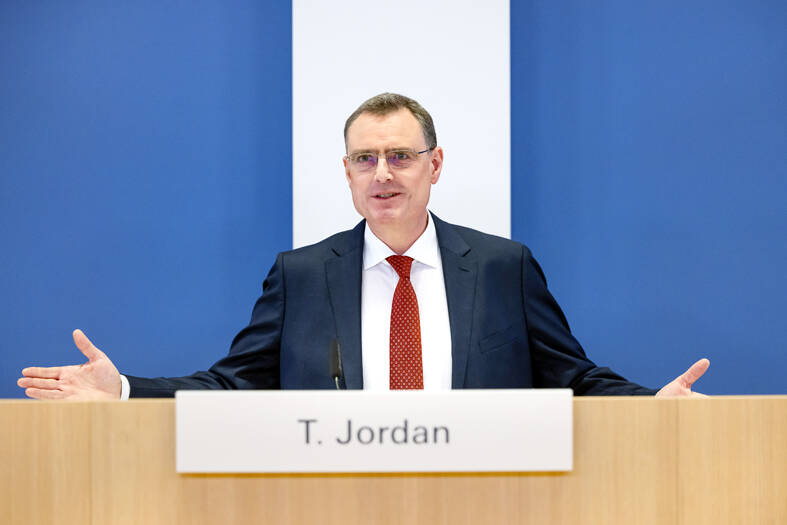The Swiss National Bank (SNB) raised interest rates by 75 basis points (bp) to bring borrowing costs above zero for the first time in almost eight years, following recent moves in the eurozone.
The hike by officials led by Thomas Jordan takes Switzerland’s policy rate to 0.5 percent and is their most aggressive tightening action in two decades.
Policymakers said they cannot rule out further rate hikes and said they are willing to intervene in currency markets if needed.

The decision ends Europe’s decade-long experiment with negative borrowing costs. Globally, the only central bank left with sub-zero policy is now the Bank of Japan, which earlier yesterday held its benchmark at minus-0.1 percent.
The SNB hike is the second move by policymakers in Zurich to confront inflation in a year when about 90 counterparts have also raised rates. The SNB has now matched the European Central Bank’s 1.25 percentage point of tightening since July.
Separately, Norway’s central bank raised its benchmark interest rate by 50 basis points yesterday, and said it plans to hike again in November.
Norges Bank’s monetary policy committee raised the sight deposit rate to 2.25 percent from 1.75 percent, having signaled last month that a hike is likely this month.
“The policy rate will most likely be raised further in November,” the bank said in a statement.
The rate, now at the highest level since 2011, is set to increase to about 3 percent during the upcoming winter, the bank said, adding that projections were more “uncertain than normal.”
Meanwhile, the Philippine central bank raised its policy rate for a fifth time this year to quell inflation pressures amid a slumping currency and a hawkish US Federal Reserve.
Bangko Sentral ng Pilipinas yesterday raised the overnight reverse repurchase rate by 50 basis points to 4.25 percent.
Indonesia’s central bank also delivered a bigger-than-expected interest rate hike to stem inflation and stabilize the rupiah, marking an aggressive turn for policymakers who were monetary policy outliers until last month.
Bank Indonesia raised the seven-day reverse repurchase rate by 50 basis points, the biggest increment since 2018, to 4.25 percent.
Bank of Korea Governor Rhee Chang-yong yesterday widened the door for an outsized rate hike after another large move by the Fed pushed the Korean won below a key level.
“I will assess with the board members how the changes in these preconditions affect domestic inflation, growth trends and foreign exchange markets to determine the extent, timing and trajectory of rate hikes,” Rhee told reporters just after the currency weakened past 1,400 to the US dollar. “But no decision has been made.”
Additional reporting by Reuters

NEW IDENTITY: Known for its software, India has expanded into hardware, with its semiconductor industry growing from US$38bn in 2023 to US$45bn to US$50bn India on Saturday inaugurated its first semiconductor assembly and test facility, a milestone in the government’s push to reduce dependence on foreign chipmakers and stake a claim in a sector dominated by China. Indian Prime Minister Narendra Modi opened US firm Micron Technology Inc’s semiconductor assembly, test and packaging unit in his home state of Gujarat, hailing the “dawn of a new era” for India’s technology ambitions. “When young Indians look back in the future, they will see this decade as the turning point in our tech future,” Modi told the event, which was broadcast on his YouTube channel. The plant would convert

‘SEISMIC SHIFT’: The researcher forecast there would be about 1.1 billion mobile shipments this year, down from 1.26 billion the prior year and erasing years of gains The global smartphone market is expected to contract 12.9 percent this year due to the unprecedented memorychip shortage, marking “a crisis like no other,” researcher International Data Corp (IDC) said. The new forecast, a dramatic revision down from earlier estimates, gives the latest accounting of the ongoing memory crunch that is affecting every corner of the electronics industry. The demand for advanced memory to power artificial intelligence (AI) tasks has drained global supply until well into next year and jeopardizes the business model of many smartphone makers. IDC forecast about 1.1 billion mobile shipments this year, down from 1.26 billion the prior

People stand in a Pokemon store in Tokyo on Thursday. One of the world highest-grossing franchises is celebrated its 30th anniversary yesterday.

Zimbabwe’s ban on raw lithium exports is forcing Chinese miners to rethink their strategy, speeding up plans to process the metal locally instead of shipping it to China’s vast rechargeable battery industry. The country is Africa’s largest lithium producer and has one of the world’s largest reserves, according to the US Geological Survey (USGS). Zimbabwe already banned the export of lithium ore in 2022 and last year announced it would halt exports of lithium concentrates from January next year. However, on Wednesday it imposed the ban with immediate effect, leaving unclear what the lithium mining sector would do in the